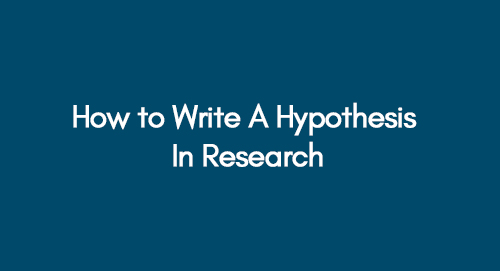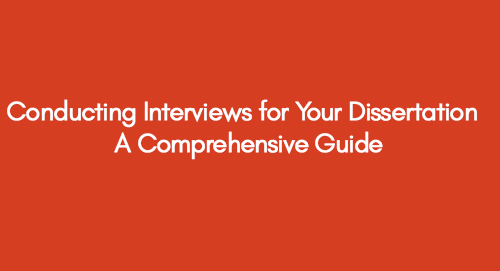A hypothesis is a statement that predicts the relationship between two or more variables. It is a critical component of the research process and provides direction for the study. Writing a good hypothesis is essential to ensure that your research is focused, rigorous, and meaningful.
Find Innovative Dissertation Topics Here
Explore New Examples for Thesis Writing Here
The following guideline will explain how to write a good hypothesis like a pro:
Why is Writing a Hypothesis Important?
A hypothesis is a fundamental element of scientific research that helps researchers to understand what will happen in an experiment. It provides a framework for scientists to focus their research and experimentation and to explore the relationship between two variables. A good hypothesis should be testable and based on previous observations or knowledge. It can be proven wrong or right through experimentation, leading to new discoveries or the elimination of incorrect possibilities.
Get Some Help in Your Thesis Writing with Our Services
In order to write a well-crafted hypothesis, it should be based on a solid foundation of previous research and knowledge. A well-written hypothesis will make the experimental process simpler and easier to understand. In contrast, a poorly written hypothesis can make an experiment much more difficult to interpret and lead to incorrect results. Put simply, writing a good hypothesis is an essential part of the scientific process and can help to ensure that experiments are conducted efficiently and effectively.
Characteristics of a Good Hypothesis
The following six characteristics should be the hallmark of a good hypothesis:
Explore Interesting Ways to Write Introduction
1- Be Clear and Concise
A good hypothesis should be clear and concise. Readers should easily understand it and should clearly state the relationship between the variables being studied. Avoid using complex language or technical jargon that can be confusing to readers. Use simple and straightforward language to communicate your ideas.
2- Based on Prior Research
A good hypothesis should be based on prior research or theoretical frameworks. It should be grounded in existing knowledge and research in the field. Conduct a thorough literature review to identify gaps in knowledge and areas where further research is needed. This will help you develop a relevant and important hypothesis for the field.
3- Testable
A good hypothesis should be testable. This means that it can be verified or falsified through empirical research. The hypothesis should be specific enough to allow for testing through observation or experimentation. It should be possible to collect data to support or refute the hypothesis.
4- Specific
A good hypothesis should be specific. It should clearly state the variables being studied and the predicted relationship between them. Avoid making generalizations or using vague language that can be interpreted in different ways. Be specific about the variables being studied and the expected outcome.
6- Directional
A good hypothesis should be directional. It should predict the direction of the relationship between the variables being studied. This means that the hypothesis should state whether the variables are positively or negatively related. A directional hypothesis provides a clear direction for the research and helps to focus the study.
6- Avoid Ambiguity
A good hypothesis should avoid ambiguity. It should not use vague or unclear language that can be interpreted in different ways. Be clear and precise in your language to avoid confusion. Use specific terms to describe the variables being studied and the predicted relationship between them.
7- Supported by Evidence
A good hypothesis should be supported by evidence. It should be based on empirical observations or data. Avoid making assumptions or unsupported claims. Use data and evidence to support your hypothesis and demonstrate its validity.
Where to Place Hypothesis?
Crafting a well-written hypothesis in research is essential, but knowing how to utilize it properly is equally important. Typically, hypotheses are formulated prior to conducting an experiment. This approach enables you to narrow down your research and design an experiment that focuses on testing your hypothesis. Sometimes in exploratory research, where the objective is to understand a phenomenon better, hypotheses may be developed after initial research.
Once you better grasp the problem at hand, you can refine your hypothesis. It is important to note that your hypothesis must be based on previous observations or knowledge. Keep in mind that a hypothesis is essentially an informed guess - it is neither right nor wrong until it has been tested. Therefore, the primary objective of any experiment is to test the hypothesis and determine whether it is correct or incorrect.
Learn About the Development of Good Hypotheses in Your Field
Effective Strategies to Craft a Hypothesis
The following tips and techniques will help you in writing a good hypothesis:
1) Start with a Question
The first step to writing a strong hypothesis is to start with a question. For example, if you are researching the effect of sugar on children's behaviour, your question might be, "Does sugar make children hyperactive?" From there, you can start to form your hypothesis.
2) Make an Educated Guess
After formulating your question, it is time to make an educated guess about the answer. In our example, we might guess that "Sugar does make children hyperactive." Once you have made your guess, you can start to develop your hypothesis.
3) Develop Your Hypothesis
Now that you have made your educated guess, it is time to turn it into a full-fledged hypothesis. A good hypothesis will be clear and concise. It should also be testable, which means it can be proved or disproved by collecting data. In our example, we might say, "If children consume sugar, they will become more hyperactive within 30 minutes." This hypothesis is testable because we can measure hyperactivity levels before and after children consume sugar.
4) Review Your Hypothesis
Once you have developed your hypothesis, reviewing it to ensure it meets all the criteria for a good hypothesis is important. Does it answer the original question? Is it concise and testable? If so, then you are ready to move on to writing your research paper.
How Long Should a Hypothesis Be?
How long a hypothesis should be is often debated amongst scientists. Some scientists believe a hypothesis should be as concise as possible, while others believe a more detailed hypothesis is better. There are pros and cons to both sides of the argument.
Those who believe that a more concise hypothesis is better to argue that it is easier to test a hypothesis if it is clear and concise. A more detailed hypothesis can be difficult to test because it may contain too many variables. However, those who believe that a more detailed hypothesis is better to argue that it can provide a richer understanding of a phenomenon. A more detailed hypothesis can also help to generate new hypotheses and ideas for future research. Ultimately, there's no right or wrong answer regarding a hypothesis's length. The important thing is to make sure that the hypothesis is clear and testable.
Navigate Useful Examples of Coursework
Conclusion
Writing a strong hypothesis for a research paper is essential to produce high-quality work. By following the tips outlined in this article, you can make sure that your hypotheses are clear, concise, testable, and based on previous research. With practice, writing strong hypotheses will become easier and easier, allowing you to perform better and better research over time!
Contact Premier Dissertations to help craft the perfect hypothesis for your next academic research.
Get an Immediate Response
Discuss your custom requirements with our writers
Free Online Plagiarism Checker For Students
We will email you the report within 24 hours.
Upload your file for free plagiarism































